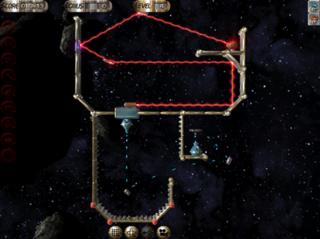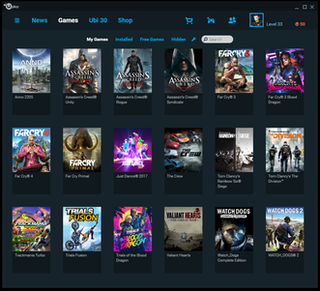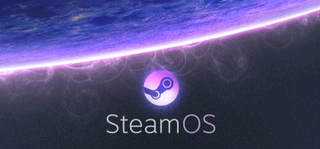
Enigmo and Enigmo 2 are respectively 2.5D and 3D arcade-style computer games for Windows, Mac OS 9, Mac OS X, iOS and PlayStation Minis developed by Pangea Software. They both involve moving certain substances into their proper containers. The music in both games was recorded by Michael Beckett.
Mac gaming refers to use of video games on Macintosh personal computers. In the 1990s, Apple computers did not attract the same level of video game development as Windows computers due to the high popularity of Windows and, for 3D gaming, Microsoft's DirectX technology. In recent years, the introduction of Mac OS X and support for Intel processors has eased porting of many games, including 3D games through use of OpenGL and more recently Apple's own Metal API. Virtualization technology and Boot Camp also permit the use of Windows and its games on Macintosh computers. Today, a growing number of popular games run natively on MacOS, though as of early 2018, a majority still require the use of Windows.
Mobipocket SA was a French company incorporated in March 2000 that created the .mobi e-book file format and produced the Mobipocket Reader software for mobile phones, personal digital assistants (PDA) and desktop operating systems.

Amazon Music is a music streaming platform and online music store operated by Amazon.com. Launched in public beta on September 25, 2007, in January 2008 it became the first music store to sell music without digital rights management (DRM) from the four major music labels, as well as many independents. All tracks were originally sold in 256 kilobits-per-second variable bitrate MP3 format without per-customer watermarking or DRM; however, some tracks are now watermarked. Licensing agreements with recording companies restrict which countries music can be sold.
Rakuten OverDrive, Inc. is an American digital distributor of eBooks, audiobooks, music, and video titles. The company provides secure management, digital rights management and download fulfillment services for publishers, libraries, schools, and retailers. OverDrive's catalog includes more than 2 million digital titles from more than 5,000 publishers. The company's global network includes more than 27,000 libraries and schools. OverDrive was founded in 1986 and is in Cleveland, Ohio.

Impulse was a digital distribution and multiplayer platform. Originally developed by Stardock to succeed Stardock Central, it was purchased by GameStop in March 2011, and was subsequently rebranded as GameStop PC Downloads, with the client being renamed GameStop App. The client was discontinued in April 2014.

GOG.com is a digital distribution platform for video games and films. It is operated by GOG Sp. z o.o., a wholly owned subsidiary of CD Projekt based in Warsaw, Poland. GOG.com delivers DRM-free video games through its digital platform for Microsoft Windows, OS X and Linux. In March 2012, it began selling more recent titles such as Alan Wake, Assassin's Creed and the Metro Redux series, among many others.

MixRadio was an online music streaming service owned by Line Corporation. The service was first introduced by Nokia in 2011 as Nokia Music for Windows Phone, serving as a successor to Nokia's previous Nokia Music Store/Comes with Music/Ovi Music Store initiatives, which was based on the LoudEye/OD2 platform. After its acquisition of Nokia's mobile phone business, the service was briefly maintained by Microsoft Mobile Oy before it was sold to Korean internet company Line Corporation in 2015. Following the acquisition, MixRadio expanded to Android and iOS in May 2015.
Humble Bundle, Inc. is a digital storefront for video games, which grew out of its original offering of Humble Bundles, collections of games sold at a price determined by the purchaser and with a portion of the price going towards charity and the rest split between the game developers. Humble Bundle continues to offer these limited-time bundles, but have expanded to include a greater and more persistent storefront. The Humble Bundle concept was initially run by Wolfire Games in 2010, but by its second bundle, the Humble Bundle company was spun out to manage the promotion, payments, and distribution of the bundles. In October 2017, the company was acquired by Ziff Davis through its IGN Entertainment subsidiary, though will continue to operate as a separate subsidiary.

Iconology Inc., d/b/a ComiXology, is a cloud-based digital distribution platform for comics, with over 200 million comic downloads as of September 2013. It offers a selection of more than 100,000 comic books, graphic novels, and manga across Android, iOS, Kindle Fire, Windows 8, and the Internet. In April 2014, ComiXology became a subsidiary of Amazon.com.

Uplay is a digital distribution, digital rights management, multiplayer and communications service developed by Massive Entertainment to provide an experience similar to the achievements/trophies offered by various other game companies. The service is provided across various platforms. The Uplay app for the Wii U was released after the launch of the console on 1 December 2012 on the Nintendo eShop. Uplay is used exclusively by first-party Ubisoft games, and although some third-party titles are sold through the Uplay store, they do not use the Uplay platform.
In the video game industry, digital distribution is the process of delivering video game content as digital information, without the exchange or purchase of new physical media. This process has existed since the early 1980s, but it was only with network advancements in bandwidth capabilities in the early 2000s that digital distribution became more prominent as a method of selling games. Currently, the process is dominated by online distribution over broadband internet.

Desura was a digital distribution platform for the Microsoft Windows, Linux and OS X platforms. The service distributed games and related media online, with a primary focus on small independent game developers rather than larger companies. Desura contained automated game updates, community features, and developer resources. The client allowed users to create and distribute game mods as well.
Kindle Direct Publishing is Amazon.com's e-book publishing unit launched in November 2007, concurrently with the first Amazon Kindle device. Amazon launched Kindle Direct Publishing (KDP), originally called Digital Text Platform, to be used by authors and publishers to independently publish their books directly to Kindle and Kindle Apps worldwide. Authors can upload documents in several formats for delivery via Whispernet and charge between $0.99 and $200.00 for their works. These documents may be written in 34 languages. In 2016, Amazon also added a paperback option which uses print-on-demand technology with the goal of offering digital and print to self-publishers. Amazon has been promoting to its authors the capability of publishing both e-books and paperbacks through the same platform. KDP's paperback option is called a "beta feature" on their website. Amazon has another self-publishing option, CreateSpace, that is still online and running so it is not clear if KDP will phase out CreateSpace; Amazon's website advertises that KDP has the advantage of linking a user's paperback and digital books in one place.
An app store is a type of digital distribution platform for computer software, often in a mobile context. Apps provide a specific set of functions which, by definition, do not include the running of the computer itself. Complex software designed for use on a personal computer, for example, may have a related app designed for use on a mobile device. Today apps are normally designed to run on a specific operating system, - such as the contemporary iOS, macOS, Windows or Android - but in the past mobile carriers had their own portals for apps and related media content.

Microsoft Store is a digital distribution platform sponsored by Microsoft. It started as an app store for Windows 8 and Windows Server 2012 as the primary means of distributing Universal Windows Platform (UWP) apps. With Windows 10, Microsoft merged its other distribution platforms into Microsoft Store, making it a unified distribution point for apps, digital videos, digital music, e-books, and console games.
A mobile app or mobile application is a computer program or software application designed to run on a mobile device such as a phone/tablet or watch. Apps were originally intended for productivity assistance such as Email, calendar, and contact databases, but the public demand for apps caused rapid expansion into other areas such as mobile games, factory automation, GPS and location-based services, order-tracking, and ticket purchases, so that there are now millions of apps available. Apps are generally downloaded from application distribution platforms which are operated by the owner of the mobile operating system, such as the App Store (iOS) or Google Play Store. Some apps are free, and others have a price, with the profit being split between the application's creator and the distribution platform. Mobile applications often stand in contrast to desktop applications which are designed to run on desktop computers, and web applications which run in mobile web browsers rather than directly on the mobile device.

SteamOS is a Debian-based Linux operating system by Valve Corporation and is the primary operating system for Valve's Steam Machine gaming hardware platform. It was released alongside the start of end-user beta testing of Steam Machines in December 2013.
Universal Windows Platform (UWP) is an open source API created by Microsoft and first introduced in Windows 10. The purpose of this platform is to help develop universal apps that run on Windows 10, Windows 10 Mobile, Xbox One and HoloLens without the need to be re-written for each. It supports Windows app development using C++, C#, VB.NET, and XAML. The API is implemented in C++, and supported in C++, VB.NET, C#, F# and JavaScript. Designed as an extension to the Windows Runtime platform first introduced in Windows Server 2012 and Windows 8, UWP allows developers to create apps that will potentially run on multiple types of devices.











